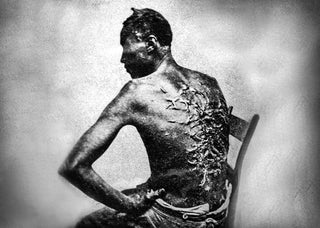

A certain resistance to discussion about the toll of American slavery isn’t confined to the least savory corners of the Internet. Last year, in an unsigned (and now withdrawn) review of historian Ed Baptist’s book The Half Has Never Been Told, the Economist took issue with Baptist’s “overstated” treatment of the topic, arguing that the increase in the country’s economic output in the 19 th century shouldn’t be chalked up to black workers’ innovations in the cotton field but rather to masters treating their slaves well out of economic self-interest—a bit of seemingly rational counterargument that ignores the moral force of Baptist’s narrative, while making space for the fantasy of kindly slavery. In a June column on the legacy of Robert E. Lee that was otherwise largely critical of the Confederate general, New York Times op-ed columnist David Brooks wrote that, though Lee owned slaves, he didn’t like owning slaves—a biographical detail whose inclusion seemed to imply that Lee’s ambivalence somehow made his slaveholding less objectionable. And in an August obituary of civil rights leader Julian Bond, the Times called his great-grandmother Jane Bond “the slave mistress of a Kentucky farmer”—a term that accords far too much agency to Bond’s ancestor and too little blame to the “farmer” who enslaved her.
While working on our Slate Academy podcast, The History of American Slavery, we encountered many types of slavery denial—frequently disguised as historical correctives and advanced by those who want to change (or end) conversation about the deep impact of slavery on American history. We’d like to offer counterarguments—some historical, some ethical—to the most common misdirections that surface in conversations about slavery. “The Irish Were Slaves Too”
Advertisement Advertisement Advertisement AdvertisementIs it true?: If we’re talking about slavery as it was practiced on Africans in the United States—that is, hereditary chattel slavery—then the answer is a clear no. As historian and public librarian Liam Hogan writes in a paper titled “The Myth of ‘Irish Slaves’ in the Colonies,” “Persons from Ireland have been held in various forms of human bondage throughout history, but they have never been chattel slaves in the West Indies.” Nor is there any evidence of Irish chattel slavery in the North American colonies. There were a large number of Irish indentured servants, and there were cases in which Irish men and women were sentenced to indentured servitude in the “new world” and forcibly shipped across the Atlantic. But even involuntary laborers had more autonomy than enslaved Africans, and the large majority of Irish indentured servants came here voluntarily.
AdvertisementWhich raises a question: Where did the myth of Irish slavery come from? A few places. The term “white slaves” emerged in the 17 th and 18 th centuries, first as a derogatory term for Irish laborers—equating their social position to that of slaves—later as political rhetoric in Ireland itself, and later still as Southern pro-slavery propaganda against an industrialized North. More recently, Hogan notes, several sources have conflated indentured servitude with chattel slavery in order to argue for a particular Irish disadvantage in the Americas, when compared to other white immigrant groups. Hogan cites several writers—Sean O’Callaghan in To Hell or Barbados and Don Jordan and Michael Walsh in White Cargo: The Forgotten History of Britain’s White Slaves in America—who exaggerate poor treatment of Irish indentured servants and intentionally conflate their status with African slaves. Neither of the authors “bother to inform the reader, in a coherent manner, what the differences are between chattel slavery and indentured servitude or forced labor,” writes Hogan.